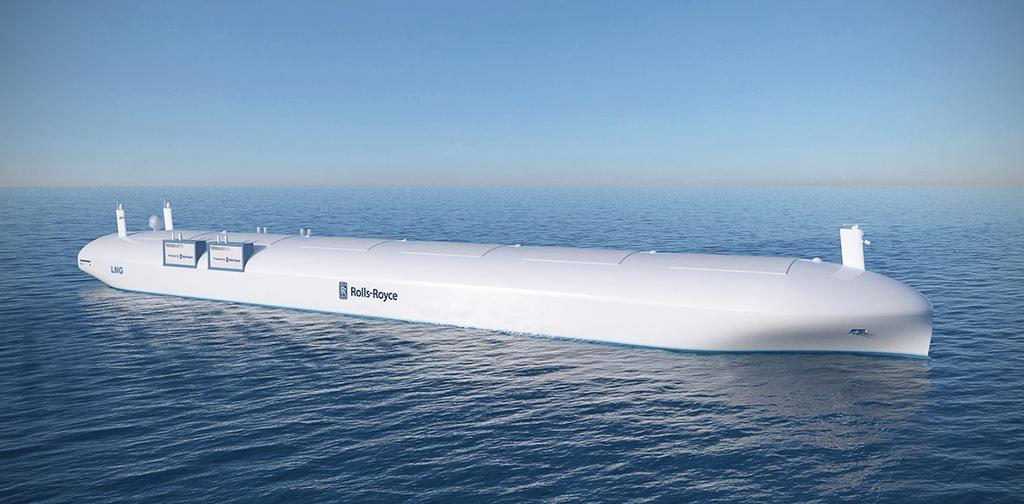Unmanned 'ghost' ships are coming
by Christian Matthews on 14 Sep 2017

Unmanned ‘ghost’ ships are coming Rolls-Royce / Flickr
Editor's Note: The headline alone is more than enough to grab you by the hair an really open your eyes! In a way, what was one to expect? We already have talk of UAVs (Drones) delivering your next pizza, and YouTube has videos of them doing some fairly amazing things, so ships had to be next. We already have plans for cable laying, surveying and raft of other things being taken care of by 'ghost ships' that use solar, wave actuators and diesel to cover huge distances, and then things like radar and AIS to avoid anything in its way, but cargo ships and LNG carriers like the Rolls-Royce one pictured here are something else!
So then, it is common in cruising to have single person watches, and solo racing means just that by definition. A lot more thought into the whole thing will need to occur before it comes to pass, but it won't be too long. Read on to find out more!
The Yara Birkeland isn’t an ordinary cargo ship. If all goes well then the vessel, currently being built for a Norwegian agricultural fertiliser company, will become the world’s first fully autonomous cargo ship when it launches in 2020.
Current international shipping law states that ocean-going vessels must be properly crewed, so fully autonomous, unmanned ships aren’t allowed in international waters. As such, the Yara Birkeland will have to operate close to the Norweigan coast at all times, carrying out regular short journeys between three ports in the south of the country.
But change is afoot in the maritime sector, and earlier this year the UN’s International Maritime Organisation (IMO) began discussions that could allow unmanned ships to operate across oceans. This raises the prospect of crewless “ghost” ships crisscrossing the ocean, with the potential for cheaper shipping with fewer accidents.
Several Japanese shipping firms, for example, are reportedly investing hundreds of millions of dollars in the technology. And British firm Rolls-Royce demonstrated the world’s first remote-controlled unmanned commercial ship earlier this year.
However, removing experienced crew from ships means that any accidents that do occur could be far more severe. On top of this, many practical, regulatory and technological barriers remain in turning the world’s cargo ships into a fully autonomous fleet, and that could mean it’s a long time before it’s actually profitable to invest in the technology.
The IMO’s Maritime Safety Committee sat for the 98th time in June 2017, starting discussions that may well lead to a change in the rules set by the International Convention for the Safety of Life at Sea. But indications are that it is likely to be a long and complex process. The issues relating to the safety and economics of unmanned ships have barely started to be considered. A lot of work will need to be done before solutions are found, or agreements are reached.
Fewer accidents?
One of the biggest issues is the safety of solely relying on computers to operate ships over vast ocean distances. Some think that autonomous ships would have fewer accidents because the majority of maritime accidents involve collisions or groundings, caused by humans. In its 2016 annual overview, the European Maritime Safety Agency found that 62% of the 880 accidents occurring globally (2011-2015) were caused by “human erroneous action”.
If we accept that autonomous vessels might be navigated without making the same mistakes as a human crew then the statistics do seem to stack up. But things are actually much more complex than that.
A study from March 2017 analysed 100 accidents that occurred from 1999 to 2015. The researchers attempted to assess whether the accidents would have been more or less likely to happen if the vessel had been unmanned. They found that the likelihood of groundings or collisions might have been decreased significantly if those vessels had been unmanned.
But they also identified that where accidents do happen, the consequences may become more severe without a crew to intervene. In particular, accidents involving fires may be more serious if there is no crew to act as firefighters. This means it’s far from clear that the overall risk from accidents would decrease significantly if ships were unmanned, although there is certainly a case to be made that there will be fewer.
The operators of cargo ships will also only adopt unmanned ships if they offer economic benefits. If profit margins can be increased, then the return on investment of buying and operating a ship may be attractive. The full picture is, again, complex. A recent study reviewing the potential economic benefits of unmanned ships found that there are indeed savings to be made, mainly related to crew pay, accommodation and utilities.
To read on, please see the full article, which is here
If you want to link to this article then please use this URL: www.sailworldcruising.com/157248